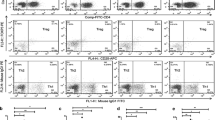Abstract
We present a case of an 81-year-old man with secondary autoimmune granulocytopenia in association with autoimmune thrombocytopenia. Treatment with granulocyte colony-stimulating factor (G-CSF) (5 μg/kg/day s.c.) resulted in a rapid increase in the number of circulating granulocytes with a pronounced left shift. These changes were accompanied by up-regulation of the surface expression of FcγRI (CD64) and FcγRII (CD32) on the granulocytes. In addition, we noted a strong up-regulation of the FcγRIII (CD16) and the activation markers CD11b and CD66b on the granulocytes. The increase in the number of circulating granulocytes was followed by a dramatic decrease in the level of cell-bound as well as circulating anti-granulocyte antibodies. It is hypothezised that the decrease in the level of cell-bound as well as circulating anti-granulocyte antibodies may be the result of an increased adsorption of the antibodies by the granulocytes.
Similar content being viewed by others
Author information
Authors and Affiliations
Additional information
Received: 2 February 1997 / Accepted: 14 May 1997
Rights and permissions
About this article
Cite this article
Vlasveld, L., de Haas, M., Ermens, A. et al. G-CSF-induced decrease of the anti-granulocyte autoantibody levels in a patient with autoimmune granulocytopenia. Ann Hematol 75, 59–64 (1997). https://doi.org/10.1007/s002770050313
Issue Date:
DOI: https://doi.org/10.1007/s002770050313




